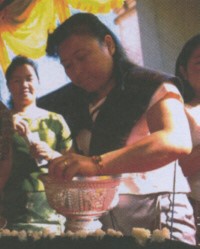Ugong in Thailand

Photo Source:
Copyrighted © 2026
Peoples of the Buddhist World, Asia Harvest All rights reserved. Used with permission |
Send Joshua Project a map of this people group.
|
| People Name: | Ugong |
| Country: | Thailand |
| 10/40 Window: | Yes |
| Population: | 500 |
| World Population: | 500 |
| Primary Language: | Ugong |
| Primary Religion: | Buddhism |
| Christian Adherents: | 1.40 % |
| Evangelicals: | 0.00 % |
| Scripture: | Unspecified |
| Ministry Resources: | No |
| Jesus Film: | No |
| Audio Recordings: | Yes |
| People Cluster: | Tibeto-Burman, other |
| Affinity Bloc: | Tibetan-Himalayan Peoples |
| Progress Level: |
|
Introduction / History
The origins of the small Ugong tribe are a mystery. It appears that they were once much more numerous, inhabiting many villages in Kanchanaburi Province and westward towards today's border between Thailand and Myanmar. The Gong say they moved to Thailand from Myanmar about 100 years ago, but it appears there are no people identified as Gong living in Myanmar today.
Clues as to the origins of the Gong may be found in their language, which is a unique variety within the Southern Lolo branch of the Tibeto-Burman linguistic family. The most closely related language to Gong appears to be Jino, spoken by about 23,000 people in far-away Yunnan Province in south-west China. The Jino claim their ancestors were soldiers who fought in Kong Ming's army during its southern conquests around AD 200. After the peace was achieved many soldiers were left behind in southern Yunnan, where they intermarried with local women and gradually formed into the Jino tribe. Could it be that some of those early settlers moved into Myanmar and—many centuries later—ended up as the Gong people in western Thailand?
The Gong are one of the smallest distinct Buddhist people groups in the world. In 1995 they numbered just 200 individuals living in two villages in western Thailand. Thirty Gong families live in Ban Kok Chiang in the Dan Chang District of Suphan Buri Province. An additional ten Gong families inhabit Ban Khog Kwai in the Ban Rai District of Uthai Thani Province. In both villages the Gong live in community with Thai people. Intermarriage with the Thai is widespread, so that today there are only a few Gong people who are true Gong people.
What Are Their Lives Like?
Gong adults speak the Gong language, although Gong children reportedly now speak Thai as their main language at home. Despite their small numbers, researchers have discovered linguistic differences between those living in the two Gong villages and have separated them as two dialects. The two villages have minimal contact with each other.
What Are Their Beliefs?
Throughout their history the Gong were animists, worshiping and being enslaved by a large number of spirit beings. About 70 years ago the Thais converted the Gong to Buddhism, and they willingly accepted. Although all Gong people now profess Buddhism as their religion, they have retained many of their traditional animistic beliefs. "They believe in supernatural powers that inhabit the sky, forest, trees, water and other natural surroundings." Once a year, the entire village "brings chickens and pig heads to make sacrifices to the village spirit. The chickens are killed near the spirit house and placed together with the pig heads inside the spirit house. After the shaman has completed the rituals, the villagers take the chickens and pig heads back to their homes where they are eaten."
What Are Their Needs?
There are no known Gong Christian believers. Few have ever heard the gospel. Most mission organizations consider them a low priority because of their small population.
Prayer Points
Pray the Gong people would see they do not have to live in slavery to spirits if they put their trust in Jesus Christ.
Pray for a movement of Jesus to heal and strengthen Ugong communities.
Pray for a "Book of Acts" type of movement to Christ among the Ugong.
Pray for Holy Spirit anointed believers from the Ugong people to change their society from within.
Pray for a movement in which the Holy Spirit leads and empowers disciples to make more disciples.